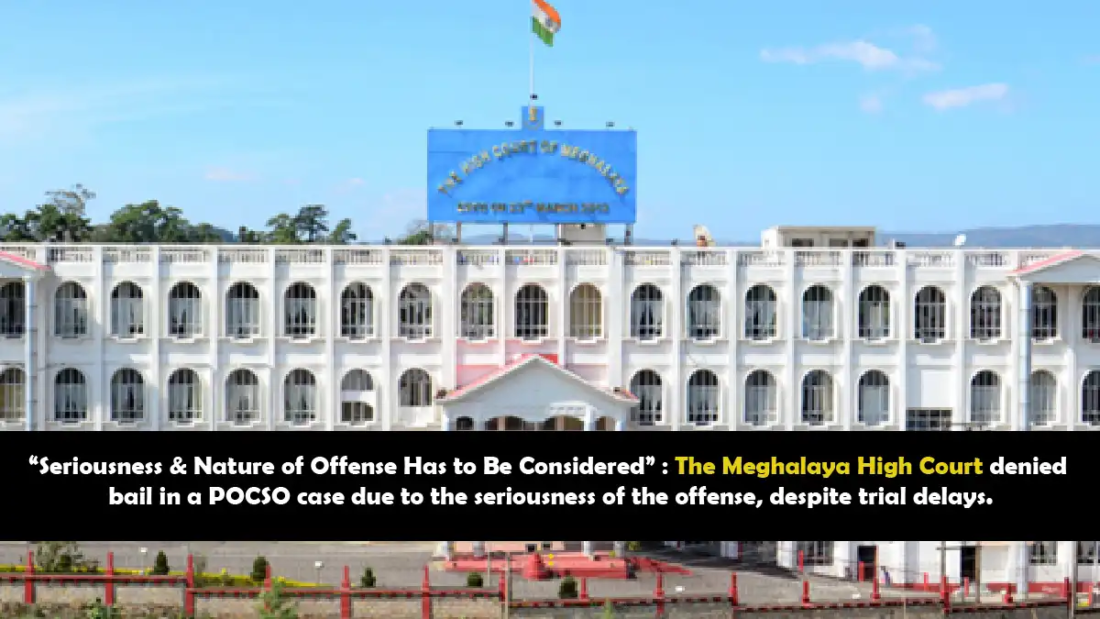Introduction
In this instance, the accused/petitioner requests bail following their apprehension on charges of molesting a minor. The petitioner claims that the delay violates his rights under Article 21 of the Indian Constitution since the case—filed under the POCSO Act—has not advanced considerably in more than a year. Due to the gravity of the crime and the possible harm to the victim, the State is against the bail request.
Facts of the Case
On March 12, 2023, the respondent No. 3 filed a First Information Report (FIR) claiming that three people, including the petitioner, had sexually molested her underage daughter. This led to the petitioner’s imprisonment. In accordance with POCSO Act Section 5(g)/6, the police opened a case, and in June 2023 the investigating officer submitted a charge sheet. The matter is presently awaiting trial before the East Khasi Hills District, Shillong, Special Judge (POCSO).
Petitioner’s argument
The petitioner’s counsel contended that the petitioner had been detained for more than a year without making much progress in the trial. She referred to POCSO Act Section 35, which stipulates that trials must be finished in a year. The trial will probably go longer than expected because there are still 32 prosecution witnesses who need to be questioned. This will rob the petitioner of his freedom and violate his rights under Article 21 of the Constitution. She asked that bail be granted to the petitioner under suitable terms.
Respondent Argument
The learned AAG representing the State, opposed the bail application, emphasizing the seriousness of the offense and the traumatic impact on the 15-year-old victim. He referred to the victim’s statement under Section 161 Cr.P.C, detailing the sequence of sexual assault events and the threats made by the petitioner. He also cited the Supreme Court case of State of Bihar & Anr v. Amit Kumar Alias Bachcha Rai, arguing that the seriousness of the offense should outweigh the duration of custody when considering bail.
Court’s Observation
The Court observed that the trial court is best qualified to assess the evidence and underlined the seriousness of the charges, which included gang rape. The Court explained that Section 35 of the POCSO Act utilizes the words “as far as possible,” indicating that the one-year period is not necessary in all instances, while acknowledging the petitioner’s claim regarding the delay in trial proceedings.
Court’s Decision
The Court rejected the bail request, citing the gravity of the crime and the possible danger to the victim. But the Court ordered the trial court to move things along quickly, requiring the survivor to be examined and charges to be framed within three weeks. The petitioner was given permission to reapply for bail following the recording of the survivor’s deposition.
Conclusion
The Court, in balancing the petitioner’s right to liberty against the seriousness of the offense and the vulnerability of the minor victim, denied the bail application. It underscored the importance of swift justice while acknowledging procedural delays. The directive to the trial court to expedite the examination of the survivor within three weeks reflects the Court’s commitment to both protecting the victim and upholding the legal rights of the accused. This decision reaffirms the principle that in cases involving serious allegations of sexual assault against minors, the safety and well-being of the victim take precedence, while also ensuring that the judicial process moves forward efficiently.
 Cart is empty
Cart is empty 

